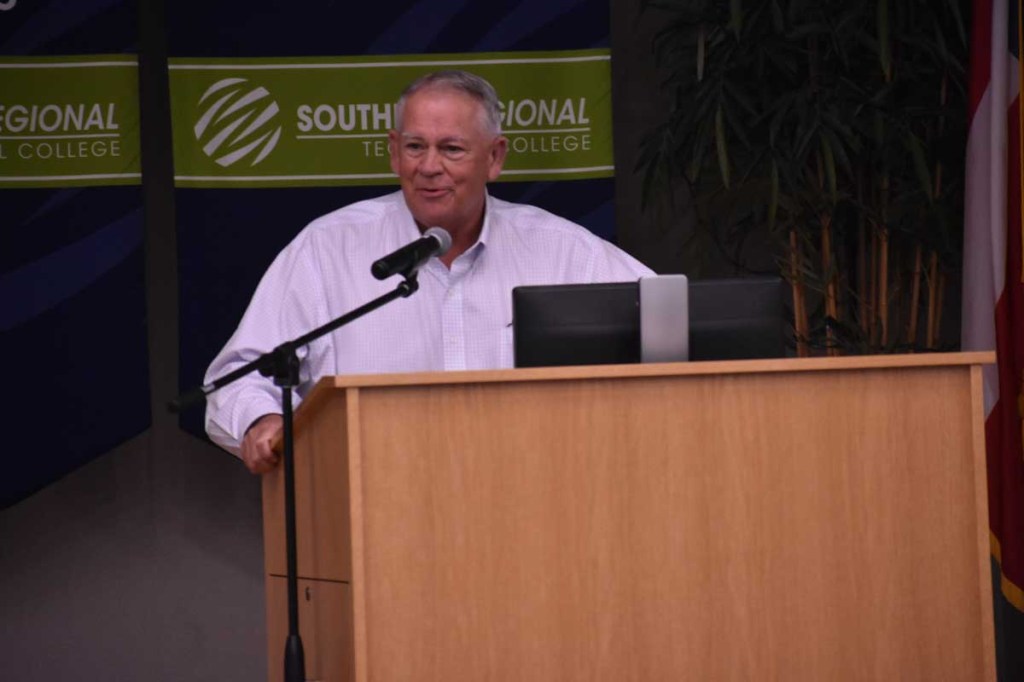Ralston speaks on Georgia’s future, reforms
Published 6:00 pm Wednesday, September 16, 2020

- Rep. David Ralston, Speaker of the Georgia House of Representatives, smiled as he spoke on his experience of driving down to Moultrie and seeing the growth of the crops. He said he was ecstatic to see how the communities he works for are making their way. Ralston was a guest of Reps. Sam Watson and Joe Campbell during a reception last week at Southern Regional Technical College in Moultrie.
MOULTRIE, Ga. — Last week’s meet and greet with local representatives was a thank you and a chance to speak on Georgia’s status quo. Rep. David Ralston took the chance to talk about the future, too.
Ralston, the speaker of the Georgia House of Representatives, came down from his home in Blue Ridge to view the results of the House’s work from a South Georgia, rural perspective.
The meet and greet gave him the perfect time to listen to people’s thoughts on that very matter.
“I want to hear what’s important to them and I know that right now a lot of people are very concerned about the COVID-19 pandemic,” Ralston said. “People are fearful and I certainly understand that.”
People are worried about their families, their jobs, their businesses and farms. Because of this the focus remains on the pandemic and probably will be until the next legislative session, Ralston said.
Specifically, COVID-19 remains a big factor in how it affects the budget. This year, 2020, saw a cut of 11 percent, but Ralston said future percentage cuts can’t be estimated yet.
There will be bills to help state residents get past some legal barriers they may face while adapting to pandemic conditions, he said.
This brought up a question: Is this an attempt to normalize what the state — and world at large — is going through instead of an attempt to make things go back to how they once were.
Ralston said he doesn’t ever think that we’ll get back to pre-pandemic conditions. He said this sort of thing — a tectonic shift, he calls it — is a common occurrence if you look back at history.
“It happened after 9/11 when now we go through security checkpoints at the airport and we go through a lot of security when going through public buildings,” he said. “We go through a lot of things we didn’t have to do before and that has become part of normal for us.”
In whatever the end outcome of COVID-19 is, society is going to be different, Ralston said. Things will not go back to the way things were. There may not be permanent mask mandates, but perhaps hygiene practices will be improved or more rigorous, and hand sanitizers will be everywhere.
“I don’t know that we know now what the new normal will look like, but it will be different,” Ralston said.
And it’s not about whether it’s a good thing or not. It’s about the need to adapt to new standards in order to survive, much like society did after 9/11, Ralston said.
“Do I like taking my shoes off when I go through the security checkpoint at the airport? Not really,” he said. “But I do because I know that’s the way it is now.”
There will be things changed that may be inconvenient or disruptive, he said , but it’s going to be what we have to live with in order to gain back that semblance of normalcy.
This, however, doesn’t roll over to the other reason for social unrest in the state and world at large: racism and police brutality.
Ralston said the process of resolving that unrest was first playing catch up.
The state of Georgia did that on June 23 when it approved House Bill 426, a hate crime bill. Georgia was one of four states who didn’t have the bill and it was a hard fight getting it passed.
“We passed it out of the House last year, the Senate wouldn’t act on it and so we pushed and pushed and pushed, and we got that bill passed,” Ralston said. “I was very proud of that. I think that sent a great message to all kinds of Georgians.”
But of course, one message isn’t enough to handle the unrest; therefore, the House is working on changes in the citizens arrest law. This is in response to the situation that led to Ahmaud Arbery’s killing. Ralston doesn’t know how the changes will shape, but he knows the actions Gregory and Travis McMichael made are unacceptable.
“We can’t tolerate people abusing any kind of legal defense in that way,” he said. “So, I’ve got a committee looking at that. I think there’ll be some reform there.”
This reform may bleed into police practices, Ralston said, but much of that will have to come from the law enforcement community. He believes in the need for a public safety component — in this case the police force — but believes there are better ways to handle situations.
“I do support having the latest, best, most humane training that we could have, so that situations like putting your knee on a guy’s neck until he dies [like in Minneapolis] doesn’t happen,” Ralston said.
The same goes for situations where an officer would shoot a person in the back seven times, like in Jacob Blake’s case in Kenosha, Wisconsin.
There’s nothing in the police manual that says that’s a good thing, Ralston said.
“I think we can look at some of the police reform measures in a broad way,” he said. “[We’re going to tell] the police and law enforcement community that we’re going to give you an opportunity to adapt and get up to date, and if you don’t, we’re going to have to do it for you.”



